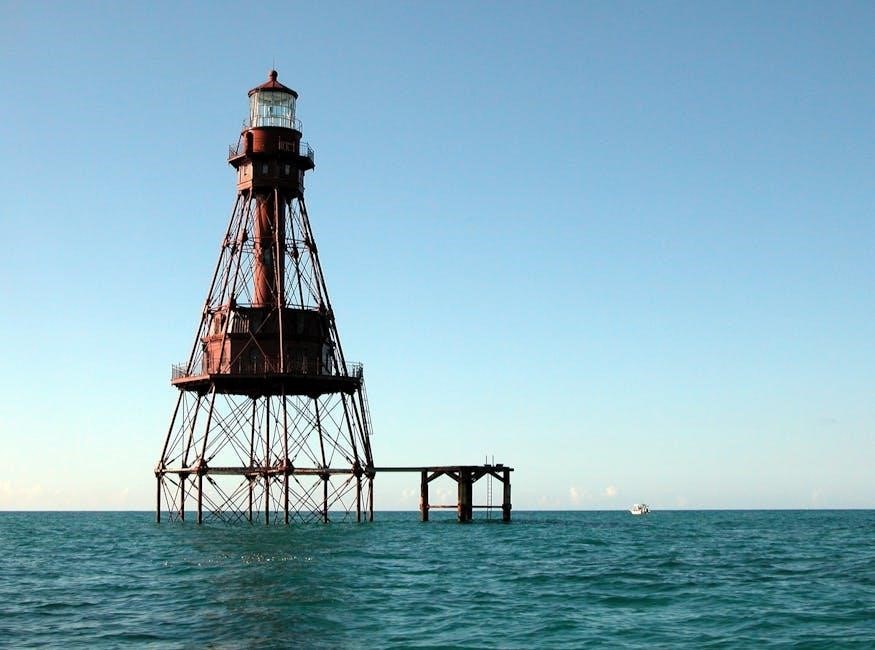Houston maritime attorneys specialize in protecting the rights of workers and businesses in one of America’s busiest ports, ensuring fair compensation and compliance with maritime regulations.
With expertise in admiralty law, they handle injuries, disputes, and vessel collisions, guiding clients through legal complexities in the maritime industry.

Overview of Maritime Law and Its Importance
Maritime law, also known as admiralty law, governs legal matters related to navigation, shipping, and commerce on waterways. In Houston, one of America’s busiest ports, this legal framework is crucial for regulating maritime activities, ensuring safety, and resolving disputes. It protects the rights of seamen, vessel owners, and businesses involved in maritime operations. Maritime law addresses issues like offshore injuries, cargo disputes, and vessel collisions, ensuring fair compensation and compliance with international and national regulations. Its importance lies in maintaining order in maritime commerce, safeguarding workers’ rights, and providing legal recourse for accidents and disputes; Understanding maritime law is essential for anyone operating in Houston’s thriving port economy.
With its complex blend of international conventions and U.S. laws, maritime law requires specialized expertise. Houston maritime attorneys play a vital role in navigating these legal waters, ensuring clients receive the protection and compensation they deserve under the law.
The Role of a Houston Maritime Attorney
A Houston maritime attorney specializes in navigating the complexities of maritime law, providing legal guidance for individuals and businesses involved in maritime activities. Their role includes handling cases related to offshore injuries, cargo disputes, vessel collisions, and contract disputes. These attorneys ensure fair compensation for injuries, protect the rights of seamen under the Jones Act, and assist with admiralty jurisdiction matters. They also help clients comply with national and international maritime regulations. With in-depth knowledge of maritime law, Houston attorneys guide clients through legal processes, negotiate settlements, and represent them in litigation. Their expertise is crucial for resolving maritime disputes efficiently and ensuring justice for those affected by maritime accidents or violations.
By combining legal expertise with industry knowledge, Houston maritime attorneys safeguard the interests of their clients in one of the nation’s busiest ports.

Practice Areas of a Houston Maritime Attorney
Houston maritime attorneys handle cases involving offshore injuries, cargo disputes, vessel collisions, admiralty jurisdiction, and maritime contracts, ensuring comprehensive legal support for maritime-related issues.
Offshore Injuries and Accidents
Houston maritime attorneys specialize in representing individuals injured in offshore accidents, ensuring they receive fair compensation under maritime law. These cases often involve complex admiralty jurisdiction and require a deep understanding of the unique challenges faced by seamen and offshore workers. Attorneys skilled in this area investigate incidents, gather evidence, and negotiate with insurance companies to secure maximum compensation for clients. They also handle claims under the Jones Act, which protects seamen’s rights. Whether it’s a rig accident, vessel collision, or other maritime incident, a Houston maritime attorney can provide expert legal guidance and support to navigate the legal process effectively.
Cargo Disputes and Commercial Maritime Cases
Cargo disputes and commercial maritime cases are complex legal matters requiring specialized expertise. Houston maritime attorneys are well-versed in handling such cases, which often involve admiralty law, international conventions, and commercial contracts. These disputes may arise from issues like cargo damage, non-delivery, or breach of contract. Attorneys skilled in this area work to resolve conflicts between shippers, carriers, and insurers, ensuring compliance with national and international regulations. They also represent clients in litigation or arbitration to recover losses or enforce contractual obligations. With a deep understanding of maritime commerce, Houston maritime lawyers provide strategic guidance to protect their clients’ interests and maximize recovery in cargo and commercial disputes.
Admiralty Law and Jurisdiction
Admiralty law, also known as maritime law, governs legal disputes arising from maritime activities, including navigation, commerce, and injuries at sea. Houston maritime attorneys specialize in admiralty law, ensuring cases fall under the correct jurisdiction, whether federal or state. Jurisdiction is often determined by the location of the incident, with federal courts typically handling cases involving navigable waters or international commerce. Attorneys must navigate complex legal frameworks, including international conventions like the Law of the Sea and national regulations such as the Jones Act. Understanding jurisdiction is critical, as it determines the applicable laws and courts for resolving disputes. Houston maritime lawyers are adept at handling these intricacies, ensuring clients’ rights are protected and cases are resolved efficiently.
Vessel Collisions and Damage Claims
Vessel collisions and damage claims are complex legal matters requiring specialized expertise. Houston maritime attorneys handle cases involving collisions between ships, boats, or other watercraft, ensuring proper investigation and resolution. These incidents often result in significant damage, injuries, or environmental harm, necessitating a thorough understanding of admiralty law and liability. Attorneys work to determine fault, assess damages, and negotiate settlements or pursue litigation. They also address insurance disputes and ensure compliance with international and domestic maritime regulations. For vessel owners, operators, or affected parties, a skilled Houston maritime lawyer provides guidance through the legal process, helping to recover losses and secure fair compensation. Their expertise is crucial in navigating the intricate legal landscape surrounding vessel collisions and related claims.
Maritime Contracts and Disputes
Maritime contracts and disputes involve complex legal issues requiring specialized expertise. Houston maritime attorneys assist clients in drafting, negotiating, and enforcing contracts related to shipping, cargo, vessel operations, and employment at sea. Disputes often arise from breaches of contract, unpaid debts, or disagreements over terms. Attorneys help resolve these issues through negotiation, mediation, or litigation. They also address matters such as charter party disputes, cargo damage claims, and employment agreements under maritime law. With in-depth knowledge of admiralty law and international conventions, Houston maritime lawyers ensure clients comply with regulations and protect their rights. Whether representing vessel owners, operators, or workers, they provide strategic guidance to achieve favorable outcomes in maritime contract disputes.

Legal Frameworks and Regulations
Maritime law in Houston is governed by international conventions and national regulations, ensuring compliance and order in maritime operations, from shipping to worker rights.
Admiralty Jurisdiction and International Conventions
Admiralty jurisdiction in Houston maritime law governs cases involving navigable waters, ships, and maritime activities. International conventions like the UN Convention on the Law of the Sea (UNCLOS) and the Maritime Labour Convention (MLC) provide frameworks for global maritime operations. These conventions ensure uniformity in legal standards, addressing issues like vessel collisions, environmental protection, and seafarers’ rights. Houston maritime attorneys must navigate these complex laws, ensuring compliance with both domestic and international regulations. Understanding admiralty jurisdiction is crucial for resolving disputes and claims arising from maritime incidents. A skilled Houston maritime attorney can guide clients through these legal intricacies, ensuring fair outcomes in cases involving international maritime conventions.
National Regulations and Compliance
National regulations play a pivotal role in shaping maritime law in Houston, ensuring compliance with both federal and state laws. The Jones Act, a cornerstone of U.S. maritime law, protects seamen’s rights and provides remedies for injuries sustained while working on vessels. Additionally, the Occupational Safety and Health Administration (OSHA) standards apply to maritime workplaces, ensuring safe working conditions. The U.S. Coast Guard enforces safety and environmental regulations, particularly in ports like Houston. Compliance with these laws is essential to avoid legal penalties and ensure smooth maritime operations. Houston maritime attorneys specialize in navigating these regulations, helping clients adhere to legal requirements while safeguarding their interests in complex maritime cases.
The Jones Act and Seamen’s Rights
The Jones Act is a federal law that protects seamen injured on the job, allowing them to seek compensation from employers for negligence. This law applies to workers on vessels navigating U.S. waters, including those in Houston’s busy ports. Seamen’s rights under the Jones Act include the right to a safe working environment and fair compensation for medical expenses, lost wages, and pain and suffering. Houston maritime attorneys specialize in Jones Act cases, helping injured seamen navigate the legal process to secure the benefits they deserve. Understanding these rights is crucial for maritime workers seeking justice and fair treatment under U.S. maritime law.

How to Hire a Houston Maritime Attorney
Start with an initial consultation to evaluate experience and expertise. Understand fee structures and choose an attorney with proven success in maritime law cases.
Initial Consultation and Evaluation
An initial consultation with a Houston maritime attorney is crucial to discuss your case details and legal options. During this meeting, the attorney will assess the strength of your claim, identify key issues, and outline potential strategies. Be prepared to provide a detailed account of the incident, including any evidence or documentation you have. This evaluation helps determine the best course of action and ensures alignment with your legal goals. A skilled attorney will also explain their approach, experience, and success in similar cases, giving you confidence in their ability to represent your interests effectively.
Key Qualifications to Look For
When selecting a Houston maritime attorney, prioritize experience in maritime law, a proven track record of success, and in-depth knowledge of admiralty law and regulations. Ensure the attorney is licensed to practice in Texas and has a strong understanding of both national and international maritime laws. Look for certifications, such as being a Proctor in Admiralty, which demonstrates expertise. Additionally, choose an attorney with excellent negotiation and trial skills, as maritime cases often require both. Check for positive client reviews, professional affiliations, and a history of handling cases similar to yours. A reputable attorney will also maintain clear communication and prioritize your best interests throughout the legal process.
Evaluating Experience in Maritime Law
Evaluating a Houston maritime attorney’s experience is crucial for ensuring they can handle your case effectively. Look for attorneys with years of specialized practice in maritime law, focusing on areas like offshore injuries, cargo disputes, and vessel collisions. Check their track record of successful outcomes and their ability to navigate complex cases. A qualified attorney should be well-versed in both national and international maritime laws, including the Jones Act and admiralty jurisdiction. Additionally, consider their experience in negotiation, mediation, and litigation, as maritime cases often require a combination of these skills. Ensure they have a deep understanding of Houston’s maritime industry and its unique challenges. A reputable attorney will also have a history of positive client reviews and peer recognition within the legal community.
Understanding Attorney Fees and Payment Structures
Understanding attorney fees is essential when hiring a Houston maritime attorney. Many maritime lawyers work on a contingency fee basis, meaning they receive a percentage of the compensation you recover. This structure ensures that you pay legal fees only if your case is successful. For commercial maritime cases, hourly rates may apply, depending on the complexity of the matter. Some attorneys may also offer free initial consultations to discuss your case and fee arrangements. Always ask about payment structures upfront to ensure transparency. Reputable attorneys will provide a clear breakdown of their fees and ensure you understand how costs will be managed throughout your case. This approach helps you make informed decisions and avoids financial surprises. Be sure to request a detailed fee agreement before proceeding.

Handling Maritime Cases
Handling maritime cases involves thorough investigation, evidence gathering, and determining liable parties. Attorneys negotiate with insurance companies, settle claims, and prepare for trials to ensure fair outcomes.
Investigation and Evidence Gathering
A thorough investigation is critical in maritime cases to determine the cause of an incident and identify liable parties. Attorneys work swiftly to preserve evidence, including accident reports, medical records, and witness statements. They also analyze vessel logs, safety records, and equipment maintenance documents to build a strong case. Experienced maritime lawyers often collaborate with experts, such as accident reconstructionists and medical professionals, to strengthen claims. Gathering and organizing evidence ensures that clients receive fair compensation for their losses. A well-documented case is essential for successful insurance negotiations, settlements, or litigation. Proper evidence collection is the foundation of a maritime attorney’s strategy to protect their client’s rights and interests effectively.
Determining Liable Parties and Jurisdiction
Determining liable parties in a maritime case requires a detailed analysis of the facts and circumstances surrounding the incident. Maritime attorneys identify potential defendants, such as vessel owners, employers, or insurance companies, by examining negligence, breach of duty, or regulatory violations. Jurisdiction is another critical factor, as maritime cases often fall under admiralty law or federal courts. The location of the incident and the type of vessel involved can influence which laws apply. Attorneys must also consider international conventions if the case involves foreign entities. Accurately determining liability and jurisdiction ensures the case is handled in the correct legal framework, maximizing the chances of a favorable outcome for the client. This step is essential for building a strong and enforceable claim.
Insurance Negotiations and Settlements
Insurance negotiations are a critical aspect of maritime cases, requiring skilled advocacy to secure fair compensation. Maritime attorneys negotiate with insurance companies to ensure clients receive adequate coverage for injuries, damages, or losses. These negotiations often involve complex discussions about policy limits, liability, and the extent of damages. Attorneys must present strong evidence, including medical records, incident reports, and expert testimony, to support their claims. The goal is to reach a settlement that fully addresses the client’s needs without compromising their rights. If negotiations fail, attorneys are prepared to escalate the case to litigation. Effective communication and strategic planning are essential to achieving favorable outcomes in insurance negotiations and settlements.
Litigation and Trial Preparation
Litigation and trial preparation are pivotal when insurance negotiations fail to yield fair outcomes. A Houston maritime attorney meticulously prepares for court, ensuring all evidence is robust and witnesses are ready to testify. This phase involves drafting legal documents, conducting depositions, and presenting expert testimonies to strengthen the case. Attorneys must anticipate opposing arguments and develop counterstrategies. Trial preparation requires a deep understanding of maritime law, jurisdictional issues, and procedural rules. Skilled attorneys communicate complex legal concepts clearly in court, advocating tirelessly for their clients’ rights. Effective litigation strategies aim to secure maximum compensation and justice, ensuring clients receive the fair resolution they deserve in maritime disputes.

Maritime Injuries and Compensation
Maritime injuries often require specialized legal attention to ensure fair compensation. Houston maritime attorneys protect seamen’s rights under the Jones Act, addressing offshore accidents and long-term disabilities.

Types of Injuries Covered Under Maritime Law
Maritime law addresses a wide range of injuries, including those sustained in offshore accidents, vessel collisions, and slip-and-fall incidents on ships or oil rigs.
Seamen and offshore workers are protected under the Jones Act for injuries caused by negligence or unsafe working conditions, ensuring compensation for medical care and lost wages.
Other covered injuries include spinal cord injuries, head trauma, and repetitive stress injuries from heavy lifting or equipment malfunctions in maritime environments.
Calculating Fair Compensation for Losses
Calculating fair compensation for maritime losses involves assessing medical expenses, lost wages, and pain and suffering caused by the injury or accident.
Attorneys consider future medical needs, permanent disability, and loss of earning capacity when determining the appropriate settlement or award.
In some cases, punitive damages may be sought if gross negligence or recklessness is proven, ensuring victims receive the full compensation they deserve under maritime law.
Long-Term Disability and Medical Benefits
Maritime law provides provisions for long-term disability and medical benefits, ensuring injured workers receive necessary care and support for ongoing health issues.
Attorneys work to secure benefits that cover future medical treatments, rehabilitation, and living expenses, helping individuals maintain their quality of life after an injury.
These benefits are crucial for seamen and offshore workers who may face permanent disabilities, ensuring they have the resources needed for long-term recovery and financial stability.

Importance of Local Expertise
Houston’s maritime industry demands attorneys with local expertise to navigate its unique challenges, ensuring clients receive tailored legal solutions that address the city’s specific maritime regulations and port operations.
Houston’s Maritime Industry and Its Challenges
Houston’s maritime industry is one of the busiest and most complex in the U.S., handling vast cargo volumes and offshore operations. The city’s strategic location along the Gulf Coast makes it a hub for international trade and energy production. However, this also presents unique challenges, such as managing vessel traffic, ensuring environmental compliance, and addressing workplace safety for seamen and offshore workers. The industry must navigate intricate legal frameworks, including admiralty law and international conventions. Additionally, disputes over cargo, injuries, and vessel collisions are common, requiring specialized legal expertise. Houston maritime attorneys play a crucial role in addressing these challenges, ensuring compliance and protecting the rights of workers and businesses operating in this dynamic and demanding environment.
Benefits of Hiring a Local Maritime Attorney
Hiring a local maritime attorney in Houston offers numerous advantages, particularly due to their in-depth understanding of the city’s unique maritime environment. Local attorneys possess extensive knowledge of Houston’s port regulations, shipping laws, and jurisdictional specifics, enabling them to navigate complex cases more effectively. Their familiarity with regional legal nuances ensures tailored strategies for offshore injuries, cargo disputes, and vessel collisions. Additionally, local attorneys often have established relationships with key stakeholders, such as ports, insurance companies, and medical providers, which can expedite case resolution. Their proximity allows for easier communication and faster response times, providing clients with personalized attention and a higher likelihood of favorable outcomes in maritime legal matters.
Understanding Houston’s Port and Shipping Regulations
Houston’s port and shipping regulations are critical to the efficient operation of maritime activities in the region. As one of the busiest ports in the U.S., Houston is subject to a complex framework of local, state, and federal laws. These regulations cover customs clearance, environmental compliance, safety standards, and cargo handling procedures. Understanding these rules is essential for businesses and individuals involved in maritime operations to avoid legal issues and ensure smooth transactions. A Houston maritime attorney can provide expert guidance on navigating these regulations, helping clients comply with all applicable laws and mitigate potential risks. Their knowledge of Houston’s specific port requirements ensures that all maritime activities are conducted legally and efficiently, safeguarding interests and preventing disputes. This expertise is invaluable in maintaining operational integrity and avoiding costly penalties.

Additional Resources
Explore recommended reading materials, websites, and legal references for maritime law. Discover top-rated Houston maritime law firms and attorneys offering specialized guidance and support for your needs.
Recommended Reading on Maritime Law
For a deeper understanding of maritime law, explore resources like “Admiralty and Maritime Law” by Robert Force and Martin Norris. This comprehensive guide covers key principles and recent developments in the field. Additionally, “Maritime Law in a Nutshell” by Frank Maraist provides a concise overview of admiralty law, perfect for both students and professionals. Online platforms like venthub.online offer detailed articles and case studies on maritime disputes, injuries, and commercial cases. For practical insights, review the Maritime Law Association of the United States publications. These materials will help you navigate the complexities of maritime law and understand the role of a Houston maritime attorney in resolving your case effectively.
Useful Websites and Legal References
For reliable information on maritime law, visit the American Bar Association (ABA) website, which offers legal resources and attorney directories. The U.S. Coast Guard website provides essential information on maritime safety and regulations. Additionally, the Federal Maritime Commission (FMC) site covers commercial maritime issues and compliance. For specialized guidance, explore the Maritime Law Association of the United States, which offers insights and resources for legal professionals. Lastly, venthub.online provides practical guides and articles on hiring a Houston maritime attorney and understanding maritime law. These websites are invaluable for anyone seeking legal assistance or knowledge in maritime law.
Maritime Law Firms in Houston
Houston is home to several renowned maritime law firms specializing in admiralty law, offshore injuries, and commercial maritime disputes. Firms like Chamberlain Hrdlicka and Stepp Law Firm offer comprehensive legal services tailored to maritime cases. These firms employ experienced attorneys with deep knowledge of maritime regulations and jurisdictional complexities. Many have been recognized for their expertise in handling cases involving vessel collisions, cargo disputes, and seamen’s rights under the Jones Act. When selecting a maritime law firm in Houston, look for one with a proven track record in maritime litigation and a strong understanding of local and international maritime laws. Their expertise ensures that clients receive effective representation and fair compensation for their maritime-related claims. Consulting a reputable firm is crucial for navigating the complexities of maritime law successfully.





